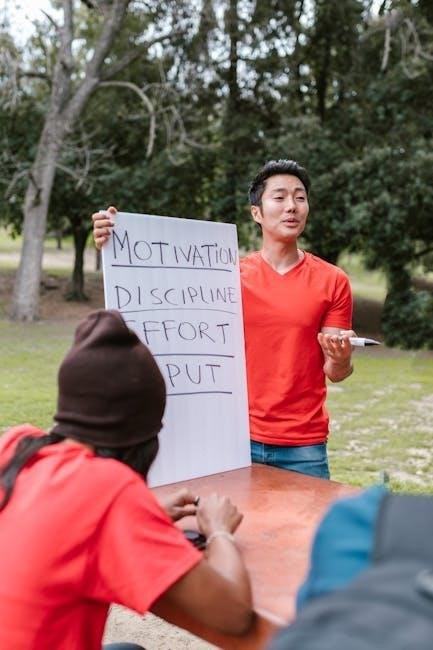Defining Happiness and Its Importance in Life

Happiness is a profound emotional state characterized by feelings of joy, contentment, and fulfillment, playing a crucial role in mental well-being and life satisfaction.
Happiness is a positive emotional state characterized by feelings of joy, contentment, and well-being. It is often described as a combination of life satisfaction and the experience of positive emotions. While happiness can vary depending on individual perspectives, it plays a vital role in mental health, social relationships, and overall life quality. Research shows that people who prioritize happiness tend to have stronger resilience, better health outcomes, and more fulfilling connections with others. By understanding and nurturing happiness, individuals can create a foundation for a meaningful and satisfying life.
Differentiating Between Joy and Happiness
Joy and happiness are often used interchangeably but hold distinct meanings. Joy is a fleeting, immediate emotion, often sparked by specific moments or experiences, such as achieving a goal or connecting with loved ones. Happiness, however, is a broader, more sustained state of well-being and life satisfaction. While joy is a momentary spark, happiness is a long-term glow, shaped by contentment, gratitude, and fulfillment. Both contribute to a meaningful life, but happiness encompasses a deeper, more enduring sense of emotional and psychological prosperity.

The Psychology Behind Happiness
Happiness stems from a combination of positive emotions, mental well-being, and life satisfaction, influenced by thoughts, behaviors, and emotional states that foster a fulfilling life experience.
The Science of Happiness and Well-Being
The science of happiness reveals it as a complex state influenced by genetics, environment, and lifestyle. Regular exercise boosts endorphins, enhancing mood and mental health. Research shows strong relationships and social connections are key predictors of long-term happiness. Practices like gratitude and mindfulness also play a significant role in fostering well-being. Studies suggest that psychological factors, such as positive emotions and cognitive reframing, contribute to sustained happiness. By understanding these elements, individuals can adopt strategies to cultivate a more fulfilling and joyful life.
The Role of Relationships in Achieving Happiness
Strong, meaningful relationships are fundamental to achieving happiness. Social connections, whether romantic, familial, or friendships, provide emotional support and a sense of belonging. Studies show that nurturing relationships enhances life satisfaction and mental well-being. Feeling valued and secure in relationships fosters joy and reduces stress. Effective communication and empathy strengthen bonds, creating a network of support that contributes to long-term happiness. Cultivating and maintaining healthy relationships is essential for emotional resilience and overall life fulfillment.
Gratitude and Its Impact on Life Satisfaction
Gratitude plays a significant role in enhancing life satisfaction by fostering a positive mindset. Recognizing and appreciating the good in life shifts focus from negatives to positives, promoting emotional well-being. Research shows that practicing gratitude can rewire the brain to prioritize joy and contentment. Simple acts, such as journaling or mindful reflection, can cultivate gratitude, reducing stress and anxiety while increasing resilience. By embracing gratitude, individuals develop a more optimistic outlook, leading to greater overall happiness and life fulfillment. This practice not only improves mental health but also strengthens relationships and personal growth.

Discovering Your Life’s Purpose
Discovering your life’s purpose involves identifying passions and aligning goals with core values, fostering a sense of direction and fulfillment that enhances overall well-being.
How to Identify Your Passions and Interests
Identifying your passions involves reflecting on moments that bring joy and fulfillment. Engage in new activities, explore hobbies, and pay attention to what excites you. Self-reflection and asking yourself about your values and desires can clarify your direction. Prayer, mindfulness, or journaling may also help uncover deeper interests. Surround yourself with supportive people who encourage exploration. Remember, identifying passions is a journey, not a destination, and it’s okay to evolve over time. This process is key to aligning your life with what truly resonates with your soul, fostering purpose and long-term happiness.

Aligning Your Goals with Your Core Values
Aligning your goals with your core values ensures a life of purpose and fulfillment. Start by identifying what matters most to you, such as honesty, creativity, or family. Reflect on how your aspirations align with these values and eliminate goals that conflict. Write down your values and regularly assess if your actions and objectives support them. This alignment fosters a sense of direction and satisfaction, helping you prioritize what truly matters. By living in harmony with your values, you create a meaningful path that resonates with your inner beliefs, leading to lasting happiness and a sense of accomplishment.
The Connection Between Purpose and Overall Well-Being
A strong sense of purpose significantly enhances overall well-being by providing direction and meaning to life. When individuals have clear goals, they often experience higher life satisfaction and resilience. Purpose fosters a sense of control and motivation, helping people navigate challenges with confidence. It also encourages engagement in activities that promote mental and physical health, such as building relationships and maintaining a positive outlook. Research shows that those with a defined purpose tend to enjoy better emotional health and a greater sense of fulfillment, contributing to a happier and more balanced life.

Cultivating a Positive Mindset
Cultivating a positive mindset involves embracing mindfulness, reframing negative thoughts, and fostering optimism. These practices help individuals navigate life’s challenges with resilience and maintain emotional balance.
The Power of Mindfulness and Presence
Mindfulness, the practice of being fully present in the moment, cultivates inner peace and reduces stress. By focusing on the here and now, individuals can observe thoughts without judgment, fostering emotional balance. Regular mindfulness exercises, such as meditation or deep breathing, help ground the mind, enhancing joy and gratitude. This mindset encourages appreciation for life’s small pleasures, leading to greater life satisfaction. Embracing presence allows individuals to connect deeply with experiences, strengthening well-being and resilience. Mindfulness is a powerful tool for navigating life’s challenges with clarity and positivity, promoting lasting happiness and fulfillment.
Reframing Negative Thoughts for a Happier Life
Reframing negative thoughts is a powerful strategy to cultivate happiness. By challenging unhelpful beliefs and replacing them with positive, realistic ones, individuals can shift their mindset. Techniques like cognitive-behavioral methods encourage identifying distorted thoughts and restructuring them constructively. This process reduces stress and enhances emotional resilience. Practicing gratitude and self-compassion further supports this transformation, fostering a more optimistic outlook. Over time, reframing negative thoughts becomes a habit, leading to increased life satisfaction and emotional well-being. Mindfulness and positivity become natural responses, helping individuals navigate life’s challenges with greater ease and confidence.
The Role of Optimism in Overcoming Life’s Challenges
Optimism plays a vital role in navigating life’s challenges by fostering resilience and hope. It enables individuals to view difficulties as temporary and solvable, rather than insurmountable. Positive thinking encourages proactive problem-solving and motivation to pursue solutions. Optimistic individuals tend to experience lower stress levels, better emotional well-being, and stronger relationships. By focusing on possibilities and growth, optimism enhances adaptability and confidence. Cultivating an optimistic mindset helps transform obstacles into opportunities for personal development, ultimately contributing to a more fulfilling and joyful life; This perspective is key to sustaining happiness and thriving amid life’s uncertainties.

Building Strong Relationships
Strong relationships are built on trust, empathy, and open communication, fostering deeper connections and mutual support, which are essential for emotional well-being and lasting happiness.
Effective Communication for Deeper Connections

Effective communication is the cornerstone of meaningful relationships. By actively listening and expressing emotions clearly, individuals foster trust and understanding, creating stronger bonds. Regular, open dialogue ensures both parties feel heard and valued, reducing misunderstandings. Empathy plays a vital role, allowing individuals to connect on a deeper level. Non-verbal cues, such as body language and tone, also enhance communication. When people communicate effectively, they build a foundation of respect and intimacy, which are essential for lasting happiness and fulfillment in personal and professional relationships. This leads to a more harmonious and supportive social environment.
Nurturing Social Bonds and Community Ties
Nurturing social bonds and community ties is essential for happiness. Strong relationships provide emotional support, reducing stress and anxiety. Engaging in community activities fosters a sense of belonging, boosting self-esteem and life satisfaction. Volunteering and helping others can increase feelings of joy and fulfillment. Building trust and collaboration within communities creates a supportive environment that promotes well-being. By investing time in social connections, individuals strengthen their network, leading to a more resilient and joyful life. Research shows that people with robust social ties tend to live longer and experience greater overall happiness.
Balancing Personal Space and Social Engagement
Balancing personal space and social engagement is crucial for maintaining emotional equilibrium and fostering happiness. While solitude allows for reflection and mental rejuvenation, social interactions provide support, joy, and a sense of belonging. Finding the right balance involves setting boundaries and prioritizing activities that align with your needs. Overextending socially can lead to burnout, while excessive isolation may result in feelings of disconnection. By listening to your inner voice and honoring your requirements, you can create a harmonious blend of solitude and social connection, enhancing overall well-being and life satisfaction. This balance is unique to each individual and may evolve over time.

Practicing Self-Care
Self-care involves nurturing your physical, emotional, and mental well-being through intentional activities like meditation, exercise, and relaxation, fostering a balanced and fulfilling life.
Physical Health and Its Link to Happiness
Physical health significantly influences happiness by promoting emotional well-being and energy levels. Regular exercise releases endorphins, which improve mood and reduce stress. A balanced diet and adequate sleep further support mental clarity and positivity. Studies show that people who prioritize physical health tend to experience higher life satisfaction. Additionally, maintaining physical health can enhance self-esteem and resilience, helping individuals cope with challenges more effectively. By incorporating healthy habits into daily routines, individuals can create a strong foundation for long-term happiness and overall well-being; This connection underscores the importance of caring for the body to nurture the mind and spirit.
Mental Well-Being and Emotional Intelligence
Mental well-being and emotional intelligence are cornerstone elements of happiness. Emotional intelligence involves recognizing, understanding, and managing emotions, which fosters healthier relationships and decision-making. High emotional intelligence helps individuals navigate life’s challenges with resilience, reducing stress and anxiety. Mental well-being encompasses feeling content, purposeful, and in control of life, which significantly contributes to overall happiness. By cultivating self-awareness and emotional balance, individuals can better cope with adversities and maintain a positive outlook. This mental harmony is essential for achieving a fulfilling and joyful life, as it allows individuals to thrive emotionally and psychologically in all aspects of their lives.
Setting Healthy Boundaries for a Balanced Life
Setting healthy boundaries is essential for maintaining a balanced life and fostering happiness. Boundaries protect personal space and time, allowing individuals to prioritize their well-being and reduce stress. Learning to say “no” and delegating tasks can enhance productivity and life satisfaction. Healthy boundaries also promote respect in relationships, ensuring mutual understanding and harmony. By establishing clear limits, individuals can focus on what truly matters, leading to a more fulfilling and joyful life. Balancing personal and professional responsibilities is key to sustaining long-term happiness and emotional stability.

Sustaining Happiness Over Time
Sustaining happiness involves adapting to life’s changes, fostering continuous growth, and building resilience. It requires maintaining positive habits and nurturing relationships to ensure long-term fulfillment and joy.
Adapting to Life’s Changes and Challenges
Adapting to life’s changes and challenges is essential for sustaining happiness. Resilience and gratitude help navigate uncertainty, fostering a positive mindset. Building strong relationships and engaging in regular physical activity enhance emotional well-being. Embracing growth opportunities and reframing negative thoughts promote long-term life satisfaction. By cultivating mental and emotional flexibility, individuals can better cope with adversity, ensuring happiness remains a consistent part of their journey despite life’s unpredictability.
Continuous Growth and Personal Development
Continuous growth and personal development are vital for lasting happiness. Engaging in lifelong learning, setting meaningful goals, and reflecting on progress foster self-awareness and fulfillment. Developing emotional intelligence enhances relationships and decision-making, while practicing mindfulness improves present-moment joy. Regularly challenging oneself to step out of comfort zones encourages resilience and confidence. Investing time in hobbies and passions also contributes to a sense of purpose. By prioritizing personal development, individuals can cultivate a mindset of continuous improvement, leading to greater life satisfaction and enduring happiness. This journey of self-enhancement ensures a dynamic and evolving pursuit of well-being.

Leave a Reply